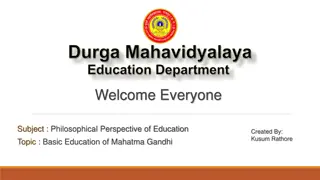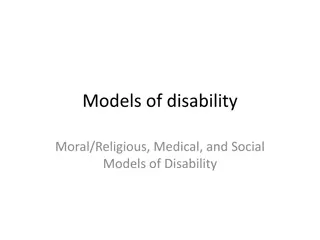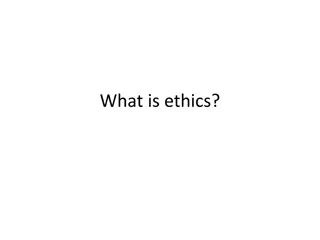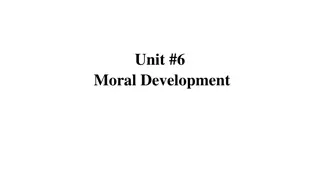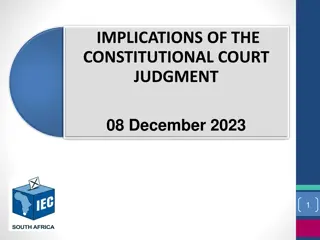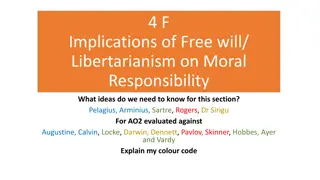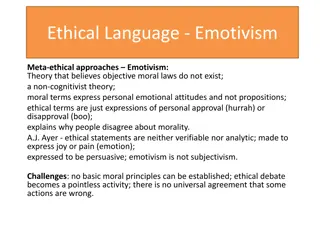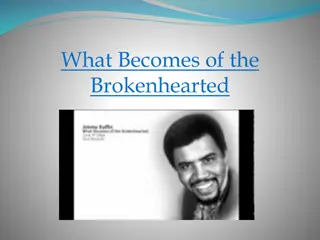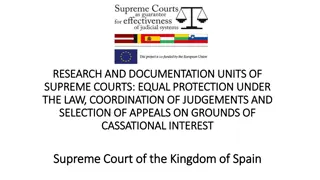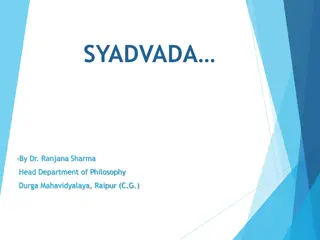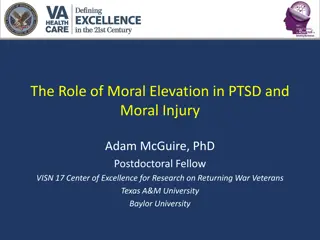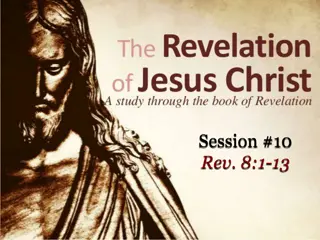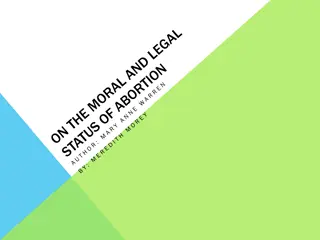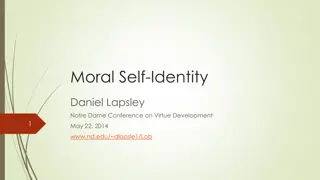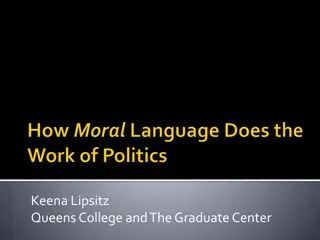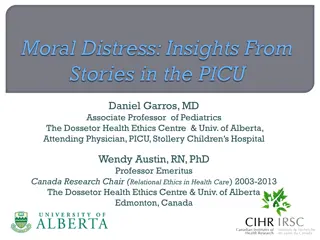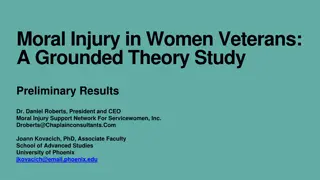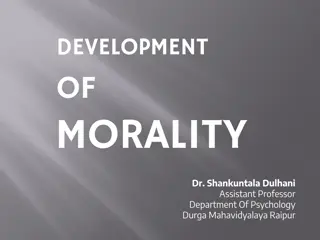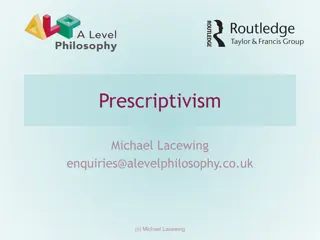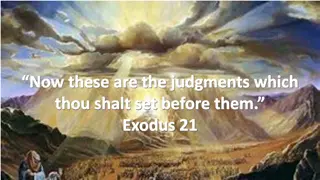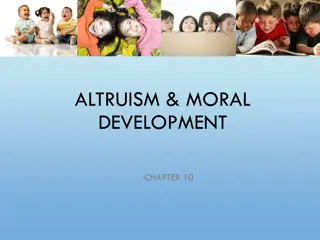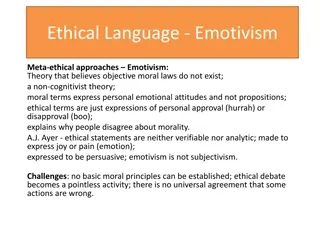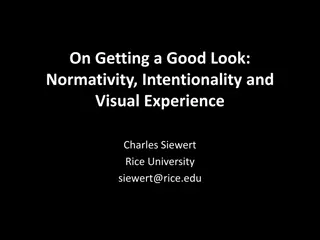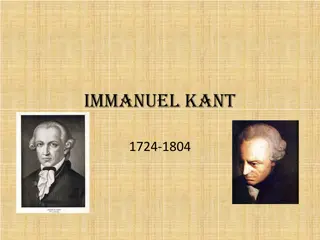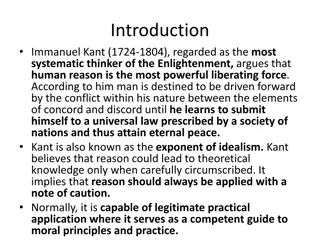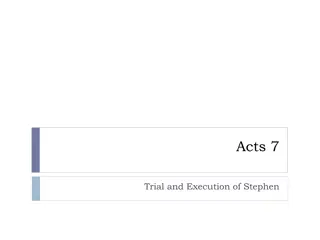Understanding the Binding Force of Supreme Court Judgments on Direct Tax
Landmark judgments of the Supreme Court regarding direct tax laws are discussed in detail, emphasizing the binding nature of Supreme Court judgments on all courts in India. The concept of precedence, acceptance or rejection of petitions for special leave to appeal, and the significance of Supreme Co
0 views • 36 slides
Uncovering the Violent History of Capitalistic Enclosures
Explore the historical context of capitalist enclosures, their violent impacts on peasants, and the moral justifications used to conceal these atrocities. Delve into how economic narratives created moral bubbles to justify violent acts, as examined through the lens of Marx's analysis. Unveil the par
1 views • 11 slides
Constitutional Court judgments with suspended orders.
The Constitutional Court in South Africa has issued judgments with suspended orders in various cases relating to Acts that were deemed inconsistent with the Constitution. Orders in cases like the Riotous Assemblies Act and Drugs and Drug Trafficking Act are set to lapse on specific dates unless the
4 views • 44 slides
Understanding Recent Judgments and Rulings on GST Issues
Dive into the latest judgments and rulings regarding GST issues, focusing on topics such as Input Tax Credit discrepancies, supplier obligations, and High Court verdicts. Explore real-life cases like Suncraft Energy Ltd. in Calcutta High Court, analyzing repercussions and legal perspectives. Gain in
2 views • 16 slides
Durga Mahavidyalaya
Education is viewed as the acquisition of knowledge, skills, beliefs, and moral habits. Mahatma Gandhi introduced his Basic Education concept emphasizing free and compulsory education, mother tongue instruction, craft-centered learning, moral education, and character building. The curriculum include
0 views • 6 slides
Understanding Models of Disability: Moral, Medical, and Social Perspectives
The concept of disability is explored through moral/religious, medical, and social models. Impairment refers to a loss or abnormality in structure or function, while disability is a restriction in performing activities. The discussion also delves into the significance of person-first language and th
1 views • 35 slides
Understanding Ethics: The Study of Morality and Human Actions
Ethics, derived from the Greek word ethos, explores the principles that guide human behavior, relationships, and moral judgments. It delves into what is right or wrong, good or bad, just or unjust, aiming to provide a framework for ethical conduct in society. With a focus on moral philosophy, ethics
5 views • 32 slides
Understanding Kohlberg's Stages of Moral Development
Kohlberg's stages of moral development, built upon Piaget's psychological theory, outline six developmental stages of moral reasoning, with each stage offering a higher level of response to moral dilemmas. Kohlberg focused on justice in moral development and emphasized the importance of how individu
0 views • 19 slides
Understanding Moral Development and Moral Reasoning
Moral development involves an individual's sense of right and wrong, influenced by family, school, friends, and societal environment. Children learn moral concepts from interactions with parents, teachers, peers, and society, shaping their understanding of good and bad. Additionally, moral reasoning
0 views • 13 slides
Analysis of Constitutional Court Judgment Implications
This analysis delves into the implications of the Constitutional Court judgment on the Electoral Amendment Act, focusing on two court challenges, three judgments rendered, and the effects on contestants and candidate nominations. The background, court challenges, judgments, and their implications ar
0 views • 17 slides
Understanding Ethics: Foundations and Principles
Ethics, a cornerstone of human behavior, encompasses descriptive, normative, and meta ethical aspects. It delves into the nature of ethics, its definition, and the essence of ethical judgment. Ethics evaluates conduct against moral ideals, aiming to guide moral judgments and actions with regard to t
0 views • 6 slides
Moral Responsibility and Free Will Implications in a Contemporary Context
This text delves into the implications of free will and libertarianism on moral responsibility, examining the ideas of various philosophers and thinkers such as Pelagius, Arminius, Sartre, and more. It explores the concepts of moral agency, determinism, normative ethics, religious beliefs, and the c
5 views • 12 slides
Understanding Emotivism in Ethical Philosophy
Emotivism is a meta-ethical theory that rejects objective moral laws, instead positing that moral terms express personal emotional attitudes, not universal truths. Influenced by A.J. Ayer and rejecting naturalism, this theory suggests that ethical statements are not objective propositions but rather
0 views • 28 slides
Understanding Modifications in Legal Judgments
Dive into the complexities of modifying legal judgments post-Final Judgment, including insightful tips on maintaining accurate records, addressing parenting issues, equitable distribution, and alimony considerations. Explore the intricacies of modifiable aspects and learn about necessary findings fo
0 views • 29 slides
Research and Documentation Units of Supreme Court in the Kingdom of Spain
The research and documentation units of the Supreme Court in the Kingdom of Spain play a crucial role in supporting decision-making, ensuring equal protection under the law, coordinating judgments, and selecting appeals based on cassational interest. The division includes a technical cabinet, legal
1 views • 14 slides
Understanding Utilitarianism and the Principle of Utility
Utilitarianism, as explained by Michael Lacewing, emphasizes that actions are morally right or wrong based on their consequences in maximizing overall happiness. The principle of utility, advocated by Bentham and Mill, guides moral judgments by promoting the greatest happiness for the greatest numbe
0 views • 9 slides
Challenges and Opportunities of Moral Revolution in Indonesia
The need for a moral revolution in Indonesia to address societal issues like corruption, conflict, and intolerance. Contrasting mental and moral revolutions, the focus is on behavior change to build a humane society with healthy moral values. Initiatives and discussions highlight the urgency of tran
0 views • 13 slides
Understanding Syadvada: Jain Theory of Judgment Explained
Syadvada, also known as the Jain theory of judgment, emphasizes the relativity of every judgment, based on the concept of Anekantvad in Jainism. According to this theory, every object has innumerable characteristics, both positive and negative. Judgments are considered relative, and complete knowled
0 views • 12 slides
Understanding Moral Elevation in PTSD and Moral Injury
The research by Dr. Adam McGuire explores the role of moral elevation in PTSD and moral injury, emphasizing how witnessing virtuous behaviors triggers emotional and physical responses leading to a desire for imitating virtuous acts. By integrating prosocial emotions into trauma treatment, the positi
0 views • 13 slides
Exploring Revelation 8:1-13 - The Opening of the Seventh Seal and Trumpet Judgments
In Session #10, Revelation 8:1-13 is delved into, marking the dramatic moment of silence in heaven as the seventh seal is opened. The seven angels with trumpets and the angel with the golden censer contribute to the unfolding apocalyptic events. This session builds on previous chapters, setting the
0 views • 16 slides
Understanding Humanity and Moral Community in the Context of Abortion Ethics
Exploring the complex ethical considerations surrounding abortion, this discussion delves into determining the humanity of a being, defining the moral community based on traits of personhood, fetal development, and the right to life. The arguments include the morality of abortion, the definition of
0 views • 9 slides
Challenges to Moral Anti-Realism: Objections and Responses
The article explores objections to moral anti-realism, including moral nihilism, condemning immorality, and the notion of moral progress in the absence of moral reality. It addresses concerns about the justification for interfering with others' behavior, the relationship between moral beliefs and ob
0 views • 6 slides
Understanding Moral Self-Identity Development
Situating moral self-identity within ethical theory and developmental psychology, this overview explores the centrality of morality within the self-concept. It discusses the chronic accessibility of moral schemas, the importance of strong evaluation in moral behavior, and the connection between mora
0 views • 33 slides
Understanding Moral and Constitutional Values in Relation to Judiciary
Explore the concepts of moral values and constitutional values, emphasizing their importance in decision-making processes and societal norms. Discover the stages of moral development and delve into constitutional values such as sovereignty, socialism, secularism, democracy, justice, liberty, equalit
0 views • 9 slides
Analysis of Moral Language in Political Communication
Explore how Republican and Democratic elites use distinctive moral language and its impact on voters in the context of the 2012 election data. Discover the application of Moral Foundations Theory in understanding political differences in the United States and how moral intuitions influence public op
0 views • 13 slides
The Influence of Disgust on Moral Behavior in Psychological Research
Explore the impact of disgust on moral behavior through various studies, including moral dilemmas and criteria for moral judgment. Research delves into how disgust affects decision-making processes related to moral dilemmas and helping behavior. Discover the connection between physical disgust and i
0 views • 16 slides
Understanding Moral Distress in Healthcare
This content discusses the concept of moral distress in healthcare, defined as the pain and anguish experienced when one knows the right thing to do but faces internal or external barriers preventing action. It explores the implications of moral distress on healthcare practitioners and emphasizes th
0 views • 25 slides
Insights on Moral Injury Among Women Veterans: Preliminary Study Findings
Preliminary results from a grounded theory study on moral injury in U.S. women veterans reveal themes such as sexual assault, hostile work environments, and more. Participants shared their experiences, highlighting the nature of moral injury they faced, distinguishing between various forms of discri
0 views • 21 slides
Understanding Moral Development: Insights and Perspectives
Morality is the belief in right behavior accepted by society. It involves moral behavior, feelings, and judgments. Moral development evolves from childhood to adulthood, influenced by experiences and challenges. Freud's id, ego, and superego theory and Skinner's behaviorism contribute to our underst
0 views • 12 slides
Exploring Moral Judgments and Prescriptive Meaning in Ethics
This content delves into non-cognitivism, Hare’s prescriptivism, and moral anti-realism to understand what we do when making moral judgments. It discusses prescriptive meaning, the concept of good, and how moral language guides actions. The objections raised regarding moral language's functions, p
0 views • 9 slides
Laws and Judgments in Exodus and Leviticus
This text outlines various laws and judgments from Exodus and Leviticus, covering topics such as the treatment of servants, consequences for murder, rules for maidservants, and detailed laws on various offenses. The laws include provisions for freedom after six years of service, the treatment of mai
0 views • 8 slides
Understanding Altruism and Moral Development Theories
Explore the components of morality, theories of moral development by prominent psychologists like Piaget and Kohlberg, and the stages of moral development in individuals. Learn about moral affect, reasoning, and behavior as integral aspects shaping one's ethical framework and decision-making process
0 views • 40 slides
Friedrich Nietzsche's Genealogy of Morals: Uncovering the Evolution of Moral Values
Friedrich Nietzsche critiques traditional philosophy for overlooking the historical development of moral concepts. He argues that moral judgments were initially based on strength and power, later evolving into the dichotomy of master and slave morality. By tracing the genealogy of moral terms, Nietz
0 views • 10 slides
Understanding Emotivism: A Non-Cognitivist Theory in Ethics
Emotivism is a meta-ethical theory that posits the absence of objective moral laws, suggesting moral terms express personal emotional attitudes rather than propositions. Influenced by philosophers like A.J. Ayer and Hume, it challenges the existence of basic moral principles and universal agreement
0 views • 23 slides
Insights into the Judgments of Revelation: A Sequential Overview
Revealing a detailed exploration of the Seal Judgments in Revelation, this content delves into the order and progression of events, distinct judgments occurring simultaneously, and significant parallels with the Book of Matthew. The content also sheds light on the duration and nature of the Tribulat
0 views • 36 slides
Exploring Normativity and Visual Experience in Consciousness Philosophy
Charles Siewert from Rice University delves into the intersection of normativity and sensory experience within the realm of consciousness philosophy. He discusses the nonreductionist stance, a phenomenological approach, and the relationship between sensory experiences and judgments. The concept of g
0 views • 44 slides
Exploring the Philosophy of Immanuel Kant
Delve into the profound philosophical works of Immanuel Kant, focusing on Kantian epistemology, the nature of judgments, synthetic a priori judgments, enlightenment, morality through the Categorical Imperative, and political theories advocating for perpetual peace. Kant's ideas challenge traditional
0 views • 8 slides
Kant's Moral Philosophy: Reason, Freedom, and the State
Immanuel Kant, a prominent Enlightenment thinker, emphasizes the liberating power of human reason in guiding individuals towards moral principles and practices. Kant's moral philosophy centers on treating each person as an end-in-itself, driven by the good will informed by reason. His concept of mor
0 views • 14 slides
Stephen's History: God's Universal Presence and Judgments
Trial and execution of Stephen unfolds as he argues about God's appearances outside Israel, the rejection by Jews, and judgments on nations. Abraham, Isaac, and Jacob's faith without a Temple but with God's presence. God judges slowly but justly, as seen in the fates of Egypt and the Amorites. Josep
0 views • 24 slides
Forms of Moral Reasoning and Ethics in Decision-Making
Explore the main forms of moral reasoning in ethical decision-making, including virtue ethics, deontological reasoning, and teleological reasoning. Understand the importance of developing ethical virtues and principles in guiding behavior. Delve into examples of reasoning from virtue and deontologic
0 views • 28 slides




